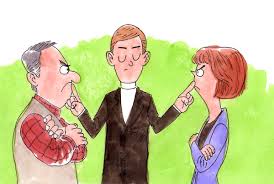
We’re a religious mix here at Horowitz Law and none of us are experts on the Bible. But we’ve seen Scripture being used by religious figures – sometimes blatantly, sometimes subtly – to attack victims, witnesses and whistleblowers and deter them from speaking up.
The goal seems to be to shame and punish and deter people who expose sexual misdeeds, not those who engage in them or cover them up.
So if you’re reporting any kind of abuse in a religious setting, be ready to hear these Biblical passages wielded as weapons against you by church officials. They will likely seem well-intentioned. But very often, they’re protecting themselves, their comfort and their positions instead of their flocks, and hope to silence you (or, more accurately, hope that you will silence yourself).
— “Let he who is without sin cast the first stone.” (John 8:7)
Often used to guilt-trip victims, witnesses and whistleblowers into feeling ashamed, keeping quiet and focusing on their own supposed wrongdoing (“I guess I shouldn’t have been drinking/out so late/wearing that skirt/alone with him, etc.”) instead of on the greater wrongdoing of the perpetrator.
— “Whoever goes about slandering reveals secrets, but he who is trustworthy in spirit keeps a thing covered.” (Proverbs 11:13)
“So also the tongue is a small member, yet it boasts of great things. How great a forest is set ablaze by such a small fire! And the tongue is a fire, a world of unrighteousness. The tongue is set among our members, staining the whole body, setting on fire the entire course of life, and set on fire by hell.” (James 3:5-6)
Often used when people have noticed a minister or church staffer acting inappropriately or suspiciously around kids but haven’t seen a ‘smoking gun’ or conclusive proof of actual abuse.
—“As the Lord has forgiven you, so you also must forgive.” (Matthew 6:12)
Who can argue against forgiveness? Even doctors and psychologists often say it’s healthy for wounded people to do.
But there’s a time and place for it. It’s NOT soon after a victim discloses their pain. To quickly bring up forgiveness can be very hurtful to a suffering victim. It can feel like someone’s trying to minimize or negate or gloss over the horror that’s happened. It can prevent a victim from doing his or her civic and moral duty: calling the police (or from “rendering unto Caesar what is Caesar’s,” as the Bible says).
Only a victim knows best if or when he or she is ready and able to forgive. No one, certainly not a minister, should try to force this very personal and private and crucial process. Remember, one reason sexual violence is so devastating is that it robs victims of important choices. So part of most victims’ recovery is realizing that, after having been violated, they still have choices and are the best situated – even when they’re hurting badly – to make those choices themselves.
— “If your brother sins against you, go and tell him his fault, between you and him alone. If he listens to you, you have gained your brother. But if he does not listen, take one or two others along with you, that every charge may be established by the evidence of two or three witnesses. If he refuses to listen to them, tell it to the church” (Matthew 18:15-17)
“Do not entertain an accusation against an elder unless it is brought by two or three witnesses.” (Proverbs 18:7-8)
Often used to prod victims to report call church figures rather than calling police, speaking publicly, filing a lawsuit or writing a blog or book about their abuse:
(These passages have been exploited for years, especially by Jehovah’s Witness officials, to tamp down or ignore abuse reports.)
None of these passages is inherently wrong. But they can be misapplied and misused for selfish purposes by the ordained to manipulate the lay people.
So if you hear these Scriptures in an abuse context, be cautious and ask yourself who benefits from silence.
